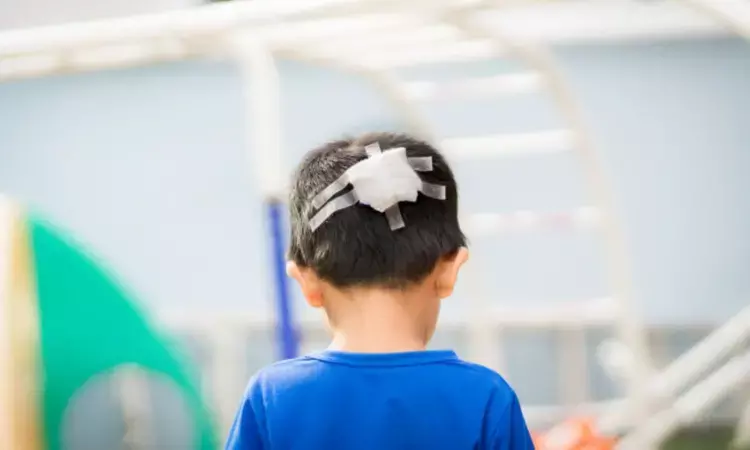- Home
- Medical news & Guidelines
- Anesthesiology
- Cardiology and CTVS
- Critical Care
- Dentistry
- Dermatology
- Diabetes and Endocrinology
- ENT
- Gastroenterology
- Medicine
- Nephrology
- Neurology
- Obstretics-Gynaecology
- Oncology
- Ophthalmology
- Orthopaedics
- Pediatrics-Neonatology
- Psychiatry
- Pulmonology
- Radiology
- Surgery
- Urology
- Laboratory Medicine
- Diet
- Nursing
- Paramedical
- Physiotherapy
- Health news
- Fact Check
- Bone Health Fact Check
- Brain Health Fact Check
- Cancer Related Fact Check
- Child Care Fact Check
- Dental and oral health fact check
- Diabetes and metabolic health fact check
- Diet and Nutrition Fact Check
- Eye and ENT Care Fact Check
- Fitness fact check
- Gut health fact check
- Heart health fact check
- Kidney health fact check
- Medical education fact check
- Men's health fact check
- Respiratory fact check
- Skin and hair care fact check
- Vaccine and Immunization fact check
- Women's health fact check
- AYUSH
- State News
- Andaman and Nicobar Islands
- Andhra Pradesh
- Arunachal Pradesh
- Assam
- Bihar
- Chandigarh
- Chattisgarh
- Dadra and Nagar Haveli
- Daman and Diu
- Delhi
- Goa
- Gujarat
- Haryana
- Himachal Pradesh
- Jammu & Kashmir
- Jharkhand
- Karnataka
- Kerala
- Ladakh
- Lakshadweep
- Madhya Pradesh
- Maharashtra
- Manipur
- Meghalaya
- Mizoram
- Nagaland
- Odisha
- Puducherry
- Punjab
- Rajasthan
- Sikkim
- Tamil Nadu
- Telangana
- Tripura
- Uttar Pradesh
- Uttrakhand
- West Bengal
- Medical Education
- Industry
Acute hyperglycemia accurate biomarker for severe brain damage in children with traumatic brain injury: Study

Brazil: In a groundbreaking development in pediatric traumatic brain injury (TBI) research, a recent study has shed light on the potential of acute hyperglycemia as a reliable biomarker for severe brain damage in children. Published in Child's Nervous System, the study underscores the significance of monitoring blood sugar levels in pediatric TBI cases to predict the extent of brain injury accurately.
Children with Glasgow Coma Scale (GCS) score ≤ 8 are 16 times more likely to develop acute hyperglycemia after TBI when compared to those with GCS > 8. Blood glucose is a biomarker with 84% accuracy to predict severe brain injury, considering the cutoff point of 200 mg/dL or 11.1 mmol/L.
Traumatic brain injury in children poses a significant public health concern, with potential long-term implications on cognitive, behavioral, and physical functions. Early identification of severe brain damage is crucial for appropriate clinical management and improving patient outcomes.
Biomarkers are substances measured at the systemic level to assess organic responses in certain situations, establishing diagnoses, disease staging, and prognosis. Blood glucose is a biomarker recognized as a predictor of prognosis in children with traumatic brain injury. José Roberto Tude Melo, School of Medical Sciences, Santa Casa of São Paulo, São Paulo, Brazil, and colleagues aimed to identify the accuracy of blood glucose as a biomarker of severe brain injury.
For this purpose, the researchers conducted a retrospective analytical study through the consecutive review of medical records of children and teenage victims of TBI who underwent neurological surgery between 2016 and 2023 in a level 1 trauma center.
Two groups were compared: children with GCS score ≤ 8 and children with GCS > 8. The predictive values were calculated to define blood glucose accuracy as a biomarker of brain injury. Ninety-two medical records were included for analysis.
The following were the key findings of the study:
- Hyperglycemia predominated in cases with GCS ≤ 8 (48% vs 3%; OR, 30).
- The glycemic measurement considering the cutoff point of 200 mg/dL or 11.1 mmol/L, showed a specificity of 97%, a positive predictive value of 86%, an accuracy of 84%, and a likelihood ratio for a positive test of 16.
While further research is warranted to validate these findings and explore underlying mechanisms, the study represents a significant step toward enhancing the precision and efficacy of pediatric TBI care. By leveraging acute hyperglycemia as a biomarker for severe brain damage, clinicians can strive towards improved outcomes and better quality of life for young patients grappling with traumatic brain injuries.
Reference:
Melo, J.R.T., de Brito Tischer, C.M., Rodrigues, F.P.A. et al. Accuracy of acute hyperglycemia as a biomarker of severe brain damage in children with traumatic brain injury. Childs Nerv Syst (2024). https://doi.org/10.1007/s00381-024-06488-4
Dr Kamal Kant Kohli-MBBS, DTCD- a chest specialist with more than 30 years of practice and a flair for writing clinical articles, Dr Kamal Kant Kohli joined Medical Dialogues as a Chief Editor of Medical News. Besides writing articles, as an editor, he proofreads and verifies all the medical content published on Medical Dialogues including those coming from journals, studies,medical conferences,guidelines etc. Email: drkohli@medicaldialogues.in. Contact no. 011-43720751


